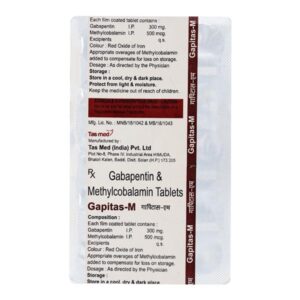GABAPENTIN + METHYL COBALAMIN
Gabapentin: Gabapentin is a medication used to treat seizures and nerve pain caused by conditions such as shingles or diabetic neuropathy. It belongs to a class of drugs called anticonvulsants, but it is also used off-label for conditions like anxiety, insomnia, and restless leg syndrome.
The exact mechanism of action of Gabapentin is not fully understood, but it is believed to work by affecting the brain’s calcium channels, which reduces the release of certain neurotransmitters. This helps to calm overactive brain activity that can cause seizures or nerve pain.
The dose of Gabapentin varies depending on the medical condition being treated. For seizures, the initial dose may be 300 mg taken orally three times a day and can be increased gradually as needed. For nerve pain, the starting dose is usually 300 mg taken once daily, and it can be increased to a maximum of 1,800 mg per day.
Common side effects of Gabapentin include dizziness, drowsiness, fatigue, coordination problems, and blurred vision. These side effects are usually mild and go away on their own. However, if they persist or worsen, it is advisable to consult a healthcare professional.
Gabapentin may also cause more serious side effects such as mood changes, suicidal thoughts, allergic reactions, swelling of the face or tongue, and difficulty breathing. If any of these side effects occur, it is essential to seek immediate medical attention.
It is important to note that Gabapentin may interact with other medications, so it is crucial to inform the healthcare professional about all other medications being used to avoid potential drug interactions.
Overall, Gabapentin is a widely used medication for the treatment of seizures and nerve pain. However, it is essential to follow the prescribed dosage and consult with a healthcare professional regarding any concerns or side effects.
Methyl Cobalamin: Methyl Cobalamin is a form of vitamin B12 that is used as a nutritional supplement. It is commonly prescribed for individuals with vitamin B12 deficiency, which can occur due to poor absorption, dietary restrictions, or certain medical conditions. Methyl Cobalamin helps to maintain healthy nerve cells and produce DNA.
The mechanism of action of Methyl Cobalamin involves its conversion into methylcobalamin, an active form of vitamin B12 in the body. Methylcobalamin functions as a cofactor for various enzymatic reactions, including the conversion of homocysteine to methionine, which is essential for the synthesis of proteins and DNA. It also plays a vital role in the production of myelin, a protective sheath around nerves.
The dose of Methyl Cobalamin may vary depending on the severity of the deficiency and individual patient factors. Typically, it is administered as an injection, usually once a week for a few weeks, followed by monthly injections for a maintenance dose. The injection can be given intramuscularly or subcutaneously.
While Methyl Cobalamin is generally considered safe and well-tolerated, it can cause some side effects. Common side effects include mild diarrhea, nausea, and itching around the injection site. Rarely, individuals may experience allergic reactions such as hives, rash, or swelling of the face, lips, or tongue. If any severe side effects occur, it is important to seek medical attention immediately.
It is essential to note that Methyl Cobalamin should only be used under the guidance and prescription of a healthcare professional. Self-medication and excessive use can be harmful and may lead to imbalances in other nutrients. It is also important for individuals with certain medical conditions, such as kidney or liver problems, to consult their healthcare provider before taking Methyl Cobalamin.

